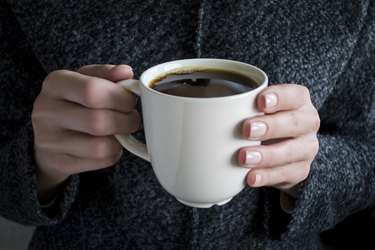
If you're like most adults, you have your cholesterol checked at least every five years. And you probably know the drill: Fast for eight to 12 hours before having your blood drawn. But what about that morning must-have cup of coffee? Knowing what's OK and what's not can make a difference.
Read more: Can You Get a False High Cholesterol Reading?
Video of the Day
Video of the Day
What’s a Cholesterol Test?
Called a lipid panel, a cholesterol test measures whether the components that make up your total cholesterol — high-density lipoprotein (HDL) cholesterol, low-density lipoprotein (LDL) cholesterol and triglycerides — are high, according to the Mayo Clinic.
The test also provides an estimate of your risk of developing cardiovascular disease and helps your doctor determine what cholesterol-lowering treatments you might need.
Importance of Fasting
Traditionally, patients are asked to fast eight to 10 hours before a cholesterol-checking blood test, which means not having anything to eat or drink in those hours leading up to your test. The rationale behind fasting is to capture most accurately your LDL cholesterol, which is considered the "bad" type of cholesterol.
Using what's called the Friedwald formula, LDL cholesterol is calculated by taking your total cholesterol minus HDL cholesterol minus your triglyceride levels, divided by five. Unless your doctor asks for a test that specifically tests LDL cholesterol, that measurement will be presented as it appears in the traditional calculation, says Matthew Tomey, MD, a cardiologist at Mount Sinai in New York City.
"You can imagine that if something you do were to affect one of those variables, in particular that triglyceride level, it could affect the LDL cholesterol estimate," Dr. Tomey says.
For example, if you eat a large, rich, fatty or high-calorie meal right before your lipid profile, that could cause an elevation in your triglyceride levels. In the Friedwald calculation, that high triglyceride level skews the LDL cholesterol measure, giving the impression that it's lower than it actually might be, Dr. Tomey adds.
However, in a study in the journal JAMA Internal Medicine, published in May 2019, researchers observed that among the 8,270 participants, the difference in cholesterol values between fasting and non-fasting measures in the same people four weeks apart was similar.
Current medical practice still includes fasting — typically not a problem for most. Dr. Tomey notes, however, that fasting might be dangerous for certain people if, for instance, they have diabetes or "brittle" blood sugar levels. (That refers to wide variations in blood sugar due to hard-to-control diabetes, says the National Institute of Health's Genetic and Rare Diseases Information Center.)
What About Coffee?
The short answer is that it's fine to drink a cup of plain black coffee before a cholesterol test. Dr. Tomey says a single cup of black coffee would make only a small difference — perhaps a couple of points — in your HDL, triglycerides and total cholesterol.
However, there's a lot of variability in what people put in their coffee. He cautions that the caloric content of things added to the coffee, such as sugar or cream, might affect your triglyceride results.
"People who do enjoy coffee should be cautious with how much creamer and caloric sweetener that they put into the coffee because that can be a meaningful source of fat and calories," Dr. Tomey says.
Read more: Is Black Coffee Good for You?
Cholesterol Testing Guidelines
The American Heart Association states that if you're 20 or older, and you are at average risk for developing coronary artery disease, you should have your cholesterol checked every four to six years.
By the time you reach 40, if your lipids indicate anything of concern or if you're already taking a cholesterol-lowering medication, such as a statin, you will need to have cholesterol tests more frequently, according to the Mayo Clinic.
- American Heart Association: “How to Get Your Cholesterol Tested”
- Mayo Clinic: “Cholesterol Test”
- Matthew I. Tomey, MD, cardiologist, assistant professor of medicine, Icahn School of Medicine, Mount Sinai, New York City
- JAMA Internal Medicine: “Association of Nonfasting vs Fasting Lipid Levels With Risk of Major Coronary Events in the Anglo-Scandinavian Cardiac Outcomes Trial–Lipid Lowering Arm”
- National Institutes of Health, Genetic and Rare Diseases Information Center: "Brittle Diabetes"
Is this an emergency? If you are experiencing serious medical symptoms, please see the National Library of Medicine’s list of signs you need emergency medical attention or call 911.